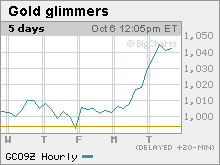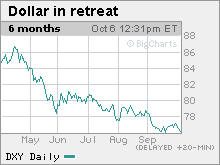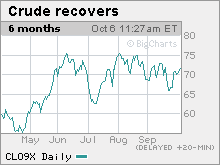Gold soars to record on dollar standard talk
A report raises doubts about the greenback's place in the oil market. Investors flock to gold and oil as the outlook for the U.S. currency dims.
NEW YORK (CNNMoney.com) -- Gold surged to a record high Tuesday after a news report sparked widespread talk about the U.S. dollar being unseated as the currency for trading oil.
Crude finished slightly higher.
A report in Britain's daily newspaper The Independent said oil-exporting countries in the Middle East and big energy consumers such as China, Russia, Japan and France were working on a plan to end the practice of buying and selling crude in dollars.
Instead, the U.S. dollar would be replaced with a basket of currencies, including the Japanese yen, Chinese yuan, the euro and gold.
That helped gold prices surge $21.90 to settle at $1,039.70 an ounce, surpassing its previous record of $1,020.20 on Sept. 16. Gold also set a new intraday high of $1,045. The previous intraday record was $1,033.90 in March 2008.
Oil prices rose 47 cents, or 0.7%, to settle at $70.88 a barrel. Earlier in the session, it reached a high of $71.77.
The dollar managed to regain some ground by midday after finance officials from Saudi Arabia, Japan and Russia publicly denied that such a plan was in the works.
Gains were limited by the Royal Bank of Australia's surprise interest rate hike, which helped boost the market's appetite for risk and weighed on the dollar.
The buck was down 0.5% versus the euro at $1.4721. It gained 0.15% against the British pound after a report showed U.K. industrial output unexpectedly plunged in August. Against the Japanese yen, the dollar was down 0.8% at ¥88.81.
An unlikely move. Analysts said the idea of shifting away from the dollar in the oil market has been around for a while, but it is not likely to happen anytime soon.
"These ideas circulate from time to time," said Sacha Tihanyi, a currency strategist at Scotia Capital. The goal is to "create a pricing for oil that's less tied to the economic fortunes of one country and therefore less volatile," he said.
With the greenback down nearly 10% against a basket of currencies since March, many of the nation's trading partners have become nervous about their reserve holdings of dollars and dollar-denominated assets.
"There's been more talk from the Middle East about hedging against dollar weakness," said Brian Hicks, an energy analyst at U.S. Global Investors. "And with the massive deficit spending in the U.S. there's concern the dollar could go lower."
Gold and oil, which are seen as hedges against a softer dollar, have become the main beneficiaries of the dollar's decline.
"We're seeing a lot of investment in commodities to hedge against dollar weakness," Hicks said. "That's helping push oil and gold higher."
Gold headed toward $1,050. Carlos Sanchez, a precious metals analyst with CPM Group, said Tuesday's rally in the gold market was largely tied to the weak dollar.
At the same time, gold prices are being supported by "ongoing concerns about financial markets and the economy," Sanchez said.
"Many are skeptical about the stock market and are expecting declines in the near term, and they're buying gold as a hedge against increased volatility," he added.
Gold is also benefiting from increased demand for jewelry ahead of the Indian marriage season and the Christmas holiday in North America, he added.
Given the current momentum in the gold market, Sanchez said the metal could top $1,050 an ounce this week.
Artificial oil boost. Some oil traders are betting that a shift away from the weak dollar is "an indication that oil prices could rise," according to Tom Pawlicki, an energy analyst at MF Global in Chicago.
Pricing crude in a stronger currency is a way for producers to "artificially keep demand buoyant," he said.
But an end to dollar-denominated oil could also result in higher prices for energy consuming countries, which would potentially have to buy crude in a stronger currency, he added.
That could eventually trickle down to the filling station and drive up gas prices. "It's negative for any kind of energy consumer," Pawlicki said. ![]()




